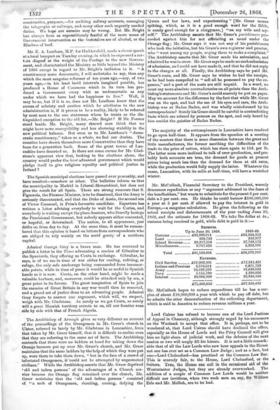Mr. E. A. Leatham, M.P. for Huddersfield, made a clever
speech at a local banquet on Tuesday evening, in which he expressed a cer- tain disguse at the weight of the Peeiage in the new Govern- ment, and characterized the Ministry as little beyond the Ministry of 1866 except in regard to Mr. Bright's inclusion in it. "A constituency more democratic, I will undertake to say, than.any which the most sanguine reformer of ten years ago,—nay, of two years ago,—in his least lucid intervals imagined possible, has produced a House of Commons which in its turn has pro- duced a Government every whit as undemocratic as any under which we have had the happiness to live." Well, it may be so, but if it is so, does not Mr. Leatham know that the excess of sobriety and caution which he attributes to the new administration is, if it proves to be a reality, likely to be referred by most men to the one statesman whom he treats as the dis-
tinguished exception to the old Bright? If Mr. Forster stood beside Mr. Bright, many shrewd men think that we might have more susceptibility and less alarming stability in the new political balance. But even as to Mr. Leatham's " demo- cratic constituency," taken as a whole, we feel our doubts. The counties have shown themselves more Conservative than they have been for a generation back. Some of the great towns of Lan- cashire have deserted us. Is there not some excuse for Mr. Glad- stone's apparent view that, looking to the elections alone, the country would prefer the least advanced government which would pledge itself to give religious equality and political justice to Ireland ?


































 Previous page
Previous page